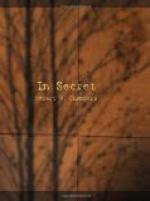“It took me a long while to place myself geographically. But finally, by map and compass, I concluded that I was in some one of the innumerable narrow valleys on the northern side of Mount Terrible. Basle seemed to be the nearest proper objective, judging from my map.... Can you form a mental picture of that particular corner of Europe, Miss Erith?”
“No.”
“Well, the German frontier did not seem to be very far northward—at least that was my idea. But there was no telling; the place where I landed was a savage and shaggy wilderness of firs and rocks without any sign of habitation or of roads.
“The things that had been strapped on my back naturally remained with me—map, binoculars, compass, botanising paraphernalia, rations for two days—that sort of thing. So I was not worried. I prowled about, experienced agreeable shivers by looking up at the mountain which had dumped me down into this valley, and finally, after eating, I started northeast by compass.
“It was a rough scramble. After I had been hiking along for several hours I realised that I was on a shelf high above another valley, and after a long while I came out where I could look down over miles of country. My map indicated that what I beheld must be some part of Alsace. Well, I lay flat on a vast shelf of rock and began to use my field-glasses.”
He was silent so long that Miss Erith finally looked up questioningly. McKay’s face had become white and stern, and in his fixed gaze there was something dreadful.
“Please,” she faltered, “go on.”
He looked at her absently; the colour came back to his face; he shrugged his shoulders.
“Oh, yes. What was I saying? Yes—about that vast ledge up there under the mountains... I stayed there three days. Partly because I couldn’t find any way down. There seemed to be none.
“But I was not bored. Oh, no. Just anxious concerning my situation. Otherwise I had plenty to look at.”
She waited, pencil poised.
“Plenty to look at,” he repeated absently. “Plenty of Huns to gaze at. Huns? They were like ants below me, there. They swarmed under the mountain ledge as far as I could see—thousands of busy Boches—busy as ants. There were narrow-gauge railways, too, apparently running right into the mountain; and a deep broad cleft, deep as another valley, and all crawling with Huns.
“A tunnel? Nobody alive ever dreamed of such a gigantic tunnel, if it was one!... Well, I was up there three days. It was the first of August—thereabouts—and I’d been afield for weeks. And, of course, I’d heard nothing of war—never dreamed of it.
“If I had, perhaps what those thousands of Huns were doing along the mountain wall might have been plainer to me.
“As it was, I couldn’t guess. There was no blasting—none that I could hear. But trains were running and some gigantic enterprise was being accomplished—some enterprise that apparently demanded speed and privacy—for not one civilian was to be seen, not one dwelling. But there were endless mazes of fortifications; and I saw guns being moved everywhere.




